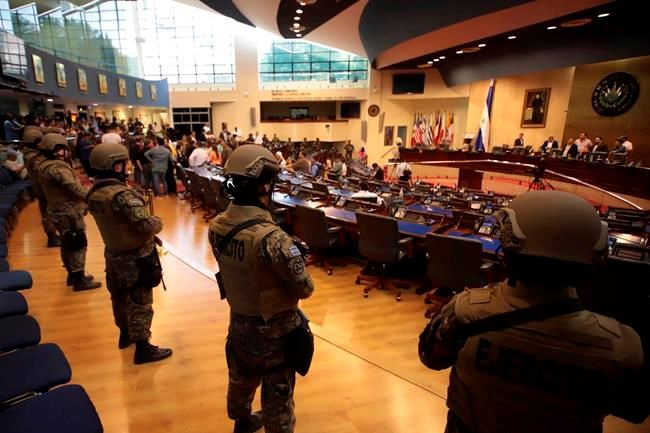MIAMI — The U.S. is slashing foreign military aid to El Salvador despite staunchly pro-American President Nayib Bukele’s intense lobbying in Washington to counter criticism he has taken his country down an authoritarian path.
Tucked into the omnibus spending bill signed Sunday by President Donald Trump was a provision barring access for El Salvador — as well as for
The ban is part of an initiative by House Democrats to strengthen anti-corruption efforts in Central America.
While far larger security assistance channeled through the Pentagon to fight drug trafficking is not affected, it’s nonetheless a symbolic blow to the countries as they try to show progress in strengthening the rule of law, said Adam Isacson at the Washington Office on Latin America.
“It basically puts these countries on the same tier as dictatorships and failed states,” said Isacson, an expert on
Israel, Egypt and more than a dozen other countries annually receive around $5.6 billion through the so-called Foreign Military Financing program to fund purchases of U.S. military equipment and services. El Salvador has received about $15 million through the program since 2016, including $1.9 million this year. Honduras and Guatemala last received such funding in 2018.
Milena Mayorga, who this month became El Salvador's ambassador in Washington, said she was surprised by the curtailment, which she said goes against decades of close military
“It's of vital importance this decision be reconsidered,” Mayorga said in an interview with The Associated Press. “Our military will always need to have certain tools to fight insecurity.”
Bukele took office in 2019 vowing to rescue El Salvador from the deep divisions left by uncontrolled gang violence and systemic corruption in both right- and left-wing governments that followed the end of a bloody civil war in 1992.
He remains popular at home thanks to a sharp reduction in one of the world's highest homicide rates. But in Washington he has drawn criticism from Democrats and some Republicans for strong-armed tactics like his decision last February to surround congress with heavily armed troops to pressure lawmakers into approving a loan to fund the fight against gangs.
Mayorga said the traditional parties that have dominated El Salvador's congress have spared no effort trying to portray Bukele as an autocrat. But she said many of the president's initiatives, such as inviting the Organization of American States to lead a commission to investigate graft, are in line with anti-corruption concerns in the U.S. Congress.
“Right now is when we most need the U.S.'s support,” said Mayorga, a popular former TV anchor who as a lawmaker angrily split with her conservative ARENA party to back Bukele.
Bukele's government tried to improve its standing in Washington by signing lobby contracts with three different Washington firms
The partial ban, which was pushed by Rep. Norma Torres, a California Democrat who is the only Central American immigrant serving in Congress, was adopted by the Senate in the federal spending bill sent this month to the president.
Also included in the spending plan is a provision threatening targeted sanctions on government officials in the so-called Northern Triangle countries — El Salvador, Guatemala and Honduras — deemed to have undermined democratic institutions. It requires the president to submit in the next 180 days a public list of corrupt individuals. That is expected to include some of the region’s most-powerful politicians, some of whom have been suspected for years of ties to drug traffickers.
Foreign aid to Central America has been the subject of much haggling in recent years. Trump in 2019 suspended aid to several countries over the continued flow of migrants from the region.
Bukele managed to resume aid by signing an agreement to allow the U.S. to send asylum seekers from other countries to El Salvador, paving the way for an era of close
President-elect Joe Biden has made Central America one of his foreign policy priorities in the Western Hemisphere and it’s unclear whether he will go along with the decision to curtail military aid to the Northern Triangle. As
___
Joshua Goodman on Twitter: @APJoshGoodman
Joshua Goodman, The Associated Press

